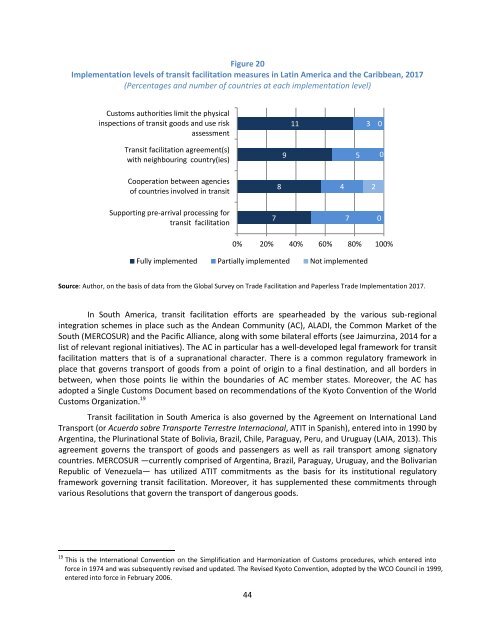Trade facilitation and paperless trade implementation in Latin America and the Caribbean: Regional Report 2017
The Global Survey on Trade Facilitation and Paperless Trade Implementation (“Global Survey”) is a global effort led by the Economic and Social Commission for Asia and the Pacific (ESCAP) in collaboration with all of the United Nations Regional Commissions, namely, the Economic Commission for Latin America and the Caribbean (ECLAC), the Economic and Social Commission for Western Asia (ESCWA), the Economic Commission for Africa (ECA) and the Economic Commission for Europe (UNECE). The goal of the Global Survey is to gather information from the member states of the respective United Nations Regional Commissions on trade facilitation and paperless trade measures and strategies implemented at the national and regional levels. The results of the survey will enable countries and development partners to better understand and monitor progress on trade facilitation, support evidence-based public policies, share best practices and identify capacity building and technical assistance needs.
The Global Survey on Trade Facilitation and Paperless Trade Implementation (“Global Survey”) is a global effort led by the Economic and Social Commission for Asia and the Pacific (ESCAP) in collaboration with all of the United Nations Regional Commissions, namely, the Economic Commission for Latin America and the Caribbean (ECLAC), the Economic and Social Commission for Western Asia (ESCWA), the Economic Commission for Africa (ECA) and the Economic Commission for Europe (UNECE). The goal of the Global Survey is to gather information from the member states of the respective United Nations Regional Commissions on trade facilitation and paperless trade measures and strategies implemented at the national and regional levels. The results of the survey will enable countries and development partners to better understand and monitor progress on trade facilitation, support evidence-based public policies, share best practices and identify capacity building and technical assistance needs.
Create successful ePaper yourself
Turn your PDF publications into a flip-book with our unique Google optimized e-Paper software.
Figure 20<br />
Implementation levels of transit <strong>facilitation</strong> measures <strong>in</strong> Lat<strong>in</strong> <strong>America</strong> <strong>and</strong> <strong>the</strong> <strong>Caribbean</strong>, <strong>2017</strong><br />
(Percentages <strong>and</strong> number of countries at each <strong>implementation</strong> level)<br />
Customs authorities limit <strong>the</strong> physical<br />
<strong>in</strong>spections of transit goods <strong>and</strong> use risk<br />
assessment<br />
11<br />
3<br />
0<br />
Transit <strong>facilitation</strong> agreement(s)<br />
with neighbour<strong>in</strong>g country(ies)<br />
9<br />
5<br />
0<br />
Cooperation between agencies<br />
of countries <strong>in</strong>volved <strong>in</strong> transit<br />
8<br />
4<br />
2<br />
Support<strong>in</strong>g pre-arrival process<strong>in</strong>g for<br />
transit <strong>facilitation</strong><br />
7<br />
7<br />
0<br />
0% 20% 40% 60% 80% 100%<br />
Fully implemented Partially implemented Not implemented<br />
Source: Author, on <strong>the</strong> basis of data from <strong>the</strong> Global Survey on <strong>Trade</strong> Facilitation <strong>and</strong> Paperless <strong>Trade</strong> Implementation <strong>2017</strong>.<br />
In South <strong>America</strong>, transit <strong>facilitation</strong> efforts are spearheaded by <strong>the</strong> various sub-regional<br />
<strong>in</strong>tegration schemes <strong>in</strong> place such as <strong>the</strong> Andean Community (AC), ALADI, <strong>the</strong> Common Market of <strong>the</strong><br />
South (MERCOSUR) <strong>and</strong> <strong>the</strong> Pacific Alliance, along with some bilateral efforts (see Jaimurz<strong>in</strong>a, 2014 for a<br />
list of relevant regional <strong>in</strong>itiatives). The AC <strong>in</strong> particular has a well-developed legal framework for transit<br />
<strong>facilitation</strong> matters that is of a supranational character. There is a common regulatory framework <strong>in</strong><br />
place that governs transport of goods from a po<strong>in</strong>t of orig<strong>in</strong> to a f<strong>in</strong>al dest<strong>in</strong>ation, <strong>and</strong> all borders <strong>in</strong><br />
between, when those po<strong>in</strong>ts lie with<strong>in</strong> <strong>the</strong> boundaries of AC member states. Moreover, <strong>the</strong> AC has<br />
adopted a S<strong>in</strong>gle Customs Document based on recommendations of <strong>the</strong> Kyoto Convention of <strong>the</strong> World<br />
Customs Organization. 19<br />
Transit <strong>facilitation</strong> <strong>in</strong> South <strong>America</strong> is also governed by <strong>the</strong> Agreement on International L<strong>and</strong><br />
Transport (or Acuerdo sobre Transporte Terrestre Internacional, ATIT <strong>in</strong> Spanish), entered <strong>in</strong>to <strong>in</strong> 1990 by<br />
Argent<strong>in</strong>a, <strong>the</strong> Plur<strong>in</strong>ational State of Bolivia, Brazil, Chile, Paraguay, Peru, <strong>and</strong> Uruguay (LAIA, 2013). This<br />
agreement governs <strong>the</strong> transport of goods <strong>and</strong> passengers as well as rail transport among signatory<br />
countries. MERCOSUR —currently comprised of Argent<strong>in</strong>a, Brazil, Paraguay, Uruguay, <strong>and</strong> <strong>the</strong> Bolivarian<br />
Republic of Venezuela— has utilized ATIT commitments as <strong>the</strong> basis for its <strong>in</strong>stitutional regulatory<br />
framework govern<strong>in</strong>g transit <strong>facilitation</strong>. Moreover, it has supplemented <strong>the</strong>se commitments through<br />
various Resolutions that govern <strong>the</strong> transport of dangerous goods.<br />
19<br />
This is <strong>the</strong> International Convention on <strong>the</strong> Simplification <strong>and</strong> Harmonization of Customs procedures, which entered <strong>in</strong>to<br />
force <strong>in</strong> 1974 <strong>and</strong> was subsequently revised <strong>and</strong> updated. The Revised Kyoto Convention, adopted by <strong>the</strong> WCO Council <strong>in</strong> 1999,<br />
entered <strong>in</strong>to force <strong>in</strong> February 2006.<br />
44


















